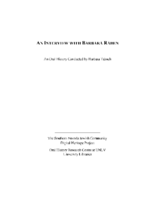Search the Special Collections and Archives Portal
Search Results

Transcript of interview with Judith D. Steele by Barbara Tabach, November 24, 2014
Date
Archival Collection
Description
In this interview she talks about student teaching in East Harlem, her teaching experiences in Providence, Rhode Island and the decision to reside in Las Vegas. When she was finally able to be promoted outside of the classroom, among her highlights was being Director of Special Education Programs and Services for the Clark County School District. In 1991, she served in a dual role as Manager of the Office of Development and Education Improvement for CCSD and Executive Director of the newly incorporated Clark County Public Education Foundation, an independent, non-profit organization established to improve public education in Southern Nevada. Among her many community activities is serving on numerous board and founder of the Henderson Arts Council.
Text

Transcript of interview with Robert D. "Bob" Fisher by Barbara Tabach, January 8, 2015
Date
Archival Collection
Description
Robert D. "Bob" Fisher is a Las Vegas, Nevada broadcast personality and lobbyist. He was born in Minneapolis, Minnesota and moved to Las Vegas in 1994 when he was hired to be the founding president and CEO of the Nevada Broadcasters Association (NVBA). During his 22 years as head of the NVBA, he produced and hosted Observations, a public affairs program broadcasted on radio and television throughout the state of Nevada. Soon after, he began producing and hosting the only weekly live television program about diabetes in the United States; in 2015 his weekly live radio program The Diabetes Show was the only one of its kind to be aired over commercial radio in the U.S. Fisher helped bring the AMBER Alert program to Nevada in 2003, and served as its chairman and coordinator for ten years. His other lobbying successes include the classification of certified broadcasters as First Responders and the elimination of Broadcaster Non-Compete contracts in 2013. He served on the Nevada Homeland Security Commission for 13 years, the Nevada Crime Commission, and the Governor's Defense Base Closure and Realignment Commission. Fisher is a founding clergy member of Midbar Kodesh Temple in Henderson, Nevada and served as its cantor for over a decade. After his retirement from NVBA at the end of 2014, he established Bob Fisher Weddings to provide his services as a wedding officiant. In this interview, conducted shortly after his retirement from NVBA, Fisher discusses his childhood in Twin Cities, and the large role Judaism played in his upbringing. He speaks at length about his involvement with United Synagogue of Conservative Judaism over the years, including as regional director of the United Synagogue Youth Far West Region, which took him from Minnesota to California. He talks about his time in Los Angeles, and later, about his life in Las Vegas, including his broadcasting career as well as involvement with Midbar Kodesh Temple.
Text

Transcript of interview with Shelley Berkley by Barbara Tabach, February 13, 2015
Date
Archival Collection
Description
In this interview, Berkley shares her family history, from her great-grandparents? immigration to the United States to her immediate family?s own migration from New York to Las Vegas. She reflects upon her childhood experience in Las Vegas, including her varied leadership positions with Jewish organizations as well as at school, from junior high school through college. Berkley also talks about her involvement as an adult within the Jewish community and more broadly as a public servant, in all levels of government.
Former United States Democratic Congresswoman Shelley Berkley represented Nevada?s 1st Congressional District from 1999 to 2013, an area that includes most of Las Vegas. During her seven terms as a member of the U.S. House of Representatives, the district benefited from millions of dollars of federal funding for education, transportation, and other projects. She also successfully fought against storing nuclear waste at Yucca Mountain in Nevada. Shelley Berkley was born Rochelle Levine in New York City in 1951 and moved to Las Vegas during junior high in 1963. She practiced law in Las Vegas and served in the Nevada Assembly for two years. She was also a member and vice chair of the Nevada University and Community College System Board of Regents. Berkley attended the University of Nevada, Las Vegas where she served as student body president and graduated with honors in 1972 with a B.A. in political science. After obtaining her J.D. in 1976 from the University of San Diego, she returned to Las Vegas to practice law. From 1976 to 1979 Berkley was Deputy Director of the Nevada State Department of Commerce. She provided legal counsel to several casinos at various points in her career, served as national director of the American Hotel-Motel Association, and founded the Southern Nevada Association of Women Attorneys and the Senior Law Project. In 1977 she married Frederic Berkley and had two children, Max and Sam. She remarried in 1999 to Dr. Lawrence Lehrner of Las Vegas, who also had two children from a previous marriage. Before being elected to Congress, Berkley served on the board of the American Israel Public Affairs Committee. She continued her vocal support of Israel in Congress and was heavily involved in all matters related to the Middle East. She was a member of several committees, including: Foreign Affairs, Veterans Affairs, Ways and Means, Small Business, and Transportation. Building a new Veterans Administration medical complex in Southern Nevada and sponsoring many pieces of healthcare legislation are also among her accomplishments as a U.S. Representative. In 2013, she was appointed CEO and Senior Provost of the Touro College and University System?s Western Division.
Text

Transcript of interview with Rabbi Malcolm Cohen by Barbara Tabach, December 16, 2015
Date
Archival Collection
Description
In this interview, Rabbi Malcolm Cohen speaks about observed differences between British and American Jewish communities as well as new Temple Sinai initiatives to build community and engage younger congregants. Rabbi Cohen and his wife have two children, Elijah and Rachel.
Rabbi Malcolm Cohen was born on October 7, 1973 in London, England. He describes having the typical Reform Jewish upbringing of a second generation Londoner. His mother worked as an office assistant, and his father ran a bookshop and also prepared youth for their bar and bat mitzvahs. It was his father?s dedication to Jewish education and service that greatly influenced his career path. After earning a degree in psychology from Southampton University, Rabbi Cohen went on to get a professional qualification in youth and community work. He subsequently became the British Reform movement?s first outreach officer, leading the efforts to engage 20- and 30-year-olds to Judaism. At his wife, Sarah?s, encouragement, Rabbi Cohen enrolled in Leo Baeck College to become a rabbi. Upon finishing his studies in 2006, he got a job at West London Synagogue, a large Reform congregation, where he worked with a team of rabbis. In 2009, Rabbi Cohen took the position as Temple Sinai?s rabbi, where he has served ever since. In this interview, he speaks about observed differences between British and American Jewish communities as well as new Temple Sinai initiatives to build community and engage younger congregants. Rabbi Cohen and his wife have two children, Elijah and Rachel.
Text

Transcript of interview with Lynn Leshgold Rosencrantz by Barbara Tabach, January 7, 2016
Date
Archival Collection
Description
In this interview, Rosencrantz discusses at length her involvement as a founder of the city?s Jewish Federation?s Young Leadership Program, including other local leaders she worked with to promote Jewish community engagement in Las Vegas. She also talks about her spiritual journey as an adult, leading to her participation at Stillpoint Center for Spiritual Development.
Text

Transcript of interview with Rabbi Bradley Tecktiel by Barbara Tabach, April 19, 2016
Date
Archival Collection
Description
Rabbi Bradley Tecktiel was born June 28, 1968 in Chicago, Illinois. He moved to New York City to attend university, where he received two Bachelor of Arts degrees: one from List College and one from Columbia University. He went on to achieve a Master?s degree from the Jewish Theological Seminary. Soon after graduating in 1996, Rabbi Tecktiel accepted his first clergy position in New Rochelle, New York. From there he went on to lead a congregation in Louisville, Kentucky, before eventually moving to Las Vegas to become the spiritual leader of Midbar Kodesh Temple in 2008. In this interview, Rabbi Tecktiel discusses the path that eventually brought him, his wife, Susan, and their three children to Las Vegas. He talks about his passion for developing Jewish community engagement and programming, and specifically about Midbar Kodesh Temple initiatives, including Yom HaShoah and educational programming. In addition, Rabbi Tecktiel reflects upon the growth of the Jewish community, both those affiliated and unaffiliated, and the impact of Jews on Las Vegas?, as well as Nevada?s, development.
Text

Transcript of interview with Carolyn Goodman by Barbara Tabach, August 18, 2016
Date
Archival Collection
Description
Carolyn Goldmark Goodman (1939- ) is the mayor of the city of Las Vegas, Nevada. She began her first four-year term in office on July 6, 2011 and was re-elected for a second term in April 2015. She succeeded her husband of 50 years, Oscar B. Goodman, who served three terms as mayor. Carolyn founded The Meadows School in Las Vegas in 1984, the state's first nonprofit, college preparatory school for pre-kindergarten through 12th grade. She oversaw planning and daily operations of the school for 26 years, retiring in 2010. Carolyn and Oscar Goodman arrived in Las Vegas in 1964. Carolyn Goodman started out working in the hotel industry, and later earned her master's degree in counseling from the University of Nevada, Las Vegas (UNLV) while raising four children. As mayor, Goodman has focused on improving public education and the local economy. She is a board member of the Las Vegas Convention and Visitors Authority and serves on the Las Vegas Global Economic Alliance (LVGEA). She is actively involved in the United States Conference of Mayors (USCM), as a member of its Advisory Board, vice-chair of its Task Force on Education Reform, and chair of the Mayors? Business Council. In 2014 Goodman received the UCSM?s Large City Climate Protection Award. As leader of the Meadows School, Goodman was recognized nationally by the Council for Advancement and Support of Education (CASE) and the National Association of Independent Schools in 2006 with the Seymour Preston Trustee Award for Leadership. She has also been honored by UNLV, receiving the Distinguished Nevada award in 1989, an Honorary Doctor of Laws degree (PhD) in 2006, and Alumni of the Year in Education in 2010. In this interview, Goodman talks about her family background and touches upon her childhood in New York City and attending Bryn Mawr College, where she met Oscar. She discusses the growth of the Las Vegas Jewish population since arriving, efforts to build Jewish community, and her involvement, including with Temple Beth Sholom and the Jewish Federation. In addition, Goodman talks at length about her husband?s political career as well as her own, both dedicated to developing Las Vegas into a safe and prosperous city, with quality education, health care, and arts and culture offerings. She also discusses establishing The Meadows School.
Text

Transcript of interview with Arne Rosencrantz by Claytee White, February 9, 2010
Date
Archival Collection
Description
In this interview, focused on the John S. Park neighborhood of Las Vegas, Arne Rosencrantz discusses his childhood growing up in Las Vegas. He talks about local businesses, including his father's furniture store, as well as schools and churches in the neighborhood.
Arne Rosencrantz remembers living on Beverly Way from 1954 to 1970. Like so many others from that era, he attended Fifth Street School, John S. Park Elementary School, John C. Fremont Middle School and graduated from Las Vegas High School. As a Jew, he was in a small minority, but fondly recalls growing up in the dense Mormon population of John S. Park Neighborhood. As a youngster, life in Las Vegas was filled with fun. The desert provided opportunity to hunt lizards and rabbits. Kids walked to school without concern. They played ball and found the Strip casinos welcoming to locals. He tells how the social issue of segregation of the 1960s did not affect him personally, but how local movie theatre owner Lloyd Katz fought to make his Huntridge and Fremont theatres integrated. He also reminisces about his father opening Hollywood Furniture and later Garrett's Furniture, which Arne operated until retiring in 2001. During the interview, he lists other furniture companies and the strong assortment of other retailers and restaurants that served the neighborhood.
Text

Transcript of interview with Barbara Raben by Barbara Tabach, February 24, 2015
Date
Archival Collection
Description
Interview with Barbara Raben by Barbara Tabach on February 24, 2015. In the first part of the interview Raben discusses her involvement with Hadassah in Southern Nevada, and the various groups within that organization. During the second part of the interview, she talks about her family and her relationship to Judaism, and moving to Las Vegas in 1991. Raben discusses the business she built in Los Angeles and Las Vegas called the Candy Factory. She then talks about the formation of Midbar Kodesh with other families from Temple Beth Sholom. Raben continues to be involved in the Jewish community and the Jewish Family Service Agency.
In 1945, Barbara Raben was born to Kermit and Adele Shulman, children of Eastern European emigrants. She enjoyed a happy childhood in Stamford, Connecticut, and was raised with a strong Jewish identity. After attending college in New Jersey, Barbara married Richard Grisar, and the couple lived in London for a year, before returning to Stamford. In 1975, Barbara and Richard moved to Los Angeles where Barbara owned and operated a very successful candy business, Candy Factory. Sixteen years later, Barbara sold her business, and the family relocated permanently to Las Vegas, where her husband owned radio stations. Barbara has always been an active member of the Jewish community, wherever she lived, giving her time to synagogue, children's day school and service organizations. Upon arriving in Las Vegas, Barbara and her family were members of Temple Beth Sholom, before leaving the congregation to start Midbar Kodesh Temple with a small group of other families. She has been an active member of Hadassah Southern Nevada Chapter for over a decade, helping rebuild the organization locally after participating in the Hadassah Leadership Academy, a program designed to engage a younger generation of members. Currently, Barbara serves as board president and interim executive director for Jewish Family Service. In 2004, then a widow, she married Terry Raben. Barbara has four sons with her first husband: Michael, Andrew, David and Marc Grisar.
Text

Transcript of interview with Rabbi Mendy Harlig by Barbara Tabach, October 18, 2017
Date
Archival Collection
Description
Known throughout the Las Vegas community as Rabbi Mendy, Mendy Harlig is a leader of the Chabad in Las Vegas, which was introduced to the valley in 1990 by his brother Rabbi Shea Harlig. Since his youth spent growing up in the Crown Heights section of Brooklyn, where he was surrounded by Hasidic Jews, Rabbi Mendy seemed destined to become a Chabad rabbi. During the early 1990s he often visited Las Vegas and assisted his brother at the Chabad of Southern Nevada. Then in 1997 he met and married Chaya Harlig and the couple permanently relocated to the valley to be the spiritual leaders of the Chabad of Green Valley. As their family grew, so did their importance to the Chabad movement in Las Vegas. During this interview, Rabbi Mendy touches upon the nature of Chabad teachings and observance in the so-called “Sin City” persona of Las Vegas. He also shares about his participation in the Las Vegas Metro Chaplaincy program. He particularly reflective of his active role immediately after of the horror of the October 1 mass casualty at the Route 91 country music festival and his perspectives afterwards.
Text
